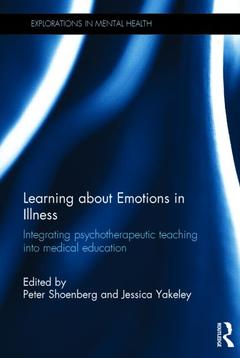Learning about Emotions in Illness Integrating psychotherapeutic teaching into medical education Explorations in Mental Health Series
Coordonnateurs : Shoenberg Peter, Yakeley Jessica

Good communication between the doctor and patient is essential for the patient to establish a trusting relationship with their doctor and to make the best use of the appropriate treatment. Traditional methods for teaching communication skills have focused on simulated clinical situations in which students learn how to improve their communication, with actors playing the part of the patients, rather than from live experiences with patients. Psychodynamic psychotherapy, with its emphasis on learning to reflect on experiences, offers the student the possibility of learning from a real experience with a patient. Such opportunities allow students to learn directly about patients? emotions, as well as to appreciate their own emotional responses to illness and to communicate better with their patients.
In this book, Peter Shoenberg, Jessica Yakeley, and their contributors who include students and teachers, discuss two different teaching approaches developed at University College London to help medical students understand the role of emotions in illness, communicate more effectively, and gain a deeper understanding of the doctor patient relationship. The benefits of Ball, Wolff and Tredgold?s Student Psychotherapy Scheme are considered alongside Shoenberg and Suckling?s short term student Balint discussion group scheme to provide clear guidance about how psychotherapeutic understanding can be used to inform medical education, with positive results.
At a time when medicine is becoming increasingly technological and there is a growing demand by the public for more psychologically minded doctors, this book will be a key resource for physicians, general practitioners, psychologists, psychiatrists and psychotherapists who are involved in medical teaching and for medical students.
Foreword Gary Rodin Introduction Peter Shoenberg 1. The UCL Student Psychotherapy Scheme Jessica Yakeley 2. Experiences of Supervisors on the UCL Student Psychotherapy Scheme Christine Van Duuren and Jennifer Johns 3. Students’ Experiences of the UCL Student Psychotherapy Scheme Jessica Yakeley, Robbie Bunt, Elsa Gubert and Caroline Hulsker 4. The Bristol Student Psychotherapy Scheme Ray Brown and Thanos Tsapas 5. Developing Student Balint Groups Peter Shoenberg and Heather Suckling 6. Professional Identity and Confusion of Boundaries Sotiris Zalidis 7. Students’ Experiences of Being in a Balint Group Noah Moran, Lara Curran and Paul Sackin 8. Research Jessica Yakeley 9. Conclusion Peter Shoenberg
Peter Shoenberg is Honorary Consultant Psychiatrist in Psychotherapy at the Camden Psychodynamic Psychotherapy Service for the Camden and Islington NHS Foundation Trust, UK. He is involved in running student Balint discussion groups and supervising students on the Student Psychotherapy Scheme at University College London, UK.
Jessica Yakeley is Consultant Psychiatrist in Forensic Psychotherapy at the Portman Clinic and Associate Medical Director and Director of Medical Education at the Tavistock and Portman NHS Foundation Trust, UK.
Date de parution : 03-2014
15.6x23.4 cm
Date de parution : 10-2015
15.6x23.4 cm
Thèmes de Learning about Emotions in Illness :
Mots-clés :
Balint; Behavioural Science; Communication; Emotions; illness; medical education; Medicine; Mental Health; psychodynamic psychotherapy; Psychology; psychotherapeutic psychotherapy; Psychotherapy; Young Man; United Bristol Healthcare Trust; UCL Medical School; Balint Groups; Vice Versa; Clinical Medical Student; Student Patient Relationship; Defensive Strategies; Undergraduate Medical Education; Psychiatric Clerkship; Doctor Patient Relationship; Outpatient Clinics; Clinical Students; Ray Brown; UK Medical Graduate; Patient’s Physical Symptoms; Van Duuren; Medical Student Participation; Student Clinical Placements; Medical Student Therapists; Balint Leader; Acute Myeloid Leukaemia; Primary Care Attachment; Genito Urinary Oncology; University College Hospital Medical School



